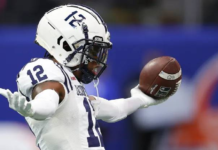Like everyone who made it all the way through the second of last week’s Democratic presidential debates, I have fallen in love with Marianne Williamson. It would take a heart of stone not to find her woke patrician elvish grandmother aesthetic anything less than enchanting.
Williamson’s debate success, if you can call it that, is as good an occasion as any to consider one of the most interesting phenomena in American politics: the perennial appeal of kook candidates for the presidency of the United States.
It is not always easy to tell the difference between generic third-party candidates (Bill Barr in 2008) or ideological outliers seeking the nomination of one of the major parties (Jim Webb in 2016) and genuine kooks. Nor should the genuine kook be mistaken for the village idiot. When Gary Johnson asked Chris Matthews what Aleppo is, he sounded ignorant rather than kooky; in response to the same question, a bona fide kook would have started ranting about how he is the only person in history who has ever read the complete text of the 9/11 Commission Report or discussing his brief stint as ambassador to Oman three or four presidencies ago before explaining why we have to withdraw all American forces from the Eastern Hemisphere — or start nuking terrorists.
Still, there are a few obvious hallmarks. The first and most obvious is that the kook candidate, if he or she has ever held political office of any kind, usually comes from the House, where the realities of geography make it possible for all sorts of odd people to get elected. A lack of previous political experience is not, however, an automatic grant of kookdom. Carly Fiorina was the furthest thing from a kook in 2016. Another thing to pay attention to is how someone dresses: A kook will either be the best or the worst dressed person on a debate stage. This often — but not always — breaks down on right versus left lines: A progressive kook like Williamson, or Lincoln Chafee, whose tie at the Democratic debate in Las Vegas in 2015 was the best I have ever seen at one of these events, will dazzle you; conservative kooks invariably wear suits that are two or three sizes too big for them.
When it comes to actual policies, kooks vary widely. Some, like former Texas Rep. Ron Paul or former Ohio Rep. Dennis Kucinich, represent a hopelessly dated or extremist version of right or left wing politics; others heap scorn on our partisan divisions and promise to transcend the right and left spectrum altogether, the way John Anderson did in 1980 when he ran as a moderate pro-equal rights amendment Social Security tax-cutting moderate against Jimmy Carter and Ronald Reagan. There are kooks who have almost impossibly detailed and specific policy platforms — Andrew Yang’s might be the best example ever — and kooks who struggle to say anything intelligible about their agendas. A well-spoken kook like Alan Keyes can talk circles around even the most articulate politician; more often, however, kooks speak cryptic, if memorable, gibberish.
The greatest kook candidate of modern times is almost certainly Ross Perot. These days Perot is usually discussed as if he were a kind of missing link between George Wallace’s two presidential bids and the rise of Donald Trump. This is entirely false. The mild-mannered Texan businessman who appeared on a debate stage with George H.W. Bush and Bill Clinton and went on to win 19 percent of the popular vote — a feat that is unlikely to be replicated at any point in the foreseeable future — was, among other things, an unabashed social liberal.
One of the most interesting things about kooks is the fact that they tend to attract the same voters regardless of the election cycle in which they appear. Nothing demonstrates the truth of the so-called horseshoe theory of politics than the willingness of the same people to support far-right Don Quixotes like Ron Paul, hippie UFO theorists like Kucinich, and populists of the center like Perot. Everyone knows at least someone who liked ole Ross, then at least considered voting for Ralph Nader in 2000, got very much into Ron Paul for eight or so years, and is now considering supporting either Yang or, only half-jokingly, Williamson.
Was Trump a kook? His lack of experience in politics and his willingness to spend his own money — though not as much as he would like us to believe — on the campaign trail would seem to suggest that he was. So does his rhetoric, which sat firmly outside the establishment of both major parties. Since receiving the GOP nomination, however, Trump has been more or less a generic Republican. But more important is the fact that a kook candidate cannot win by definition. The favorite pastime of kook voters is sitting back and talking about what it would have been like if John Anderson or Pat Buchanan had actually become president.
Which is why I have an enormous soft spot for all of these people, the candidates and their supporters alike. The programs are ridiculous. Perot’s balanced budget amendment is probably the only thing that might have been worse for the American economy than the free trade policies he criticized so incisively. Ron Paul and Kucinich would each have bankrupted the country, the former by eliminating the income tax, the latter by octupling it. But modern politics is hopelessly dreary. It is at the level of fantasy that most of us are able to engage with politics at all. We savor the promise of, say, Obama’s early speeches and rallies and ignore what a sordid waste of time his administration actually was; we tell ourselves that Trump is a tribune of the plebs at home and a diplomatic genius to all of his enemies abroad, and ignore the fact that with the same record in office, if his name were Blueblazer McEntrepreneurship he would be, well, Mitt Romney. But we like them anyway.
We should offer the same — if not greater — esteem to politicians whose dreams were more beautiful than those of the winners, indeed, too beautiful ever to be sullied by the reality of elected office.


















